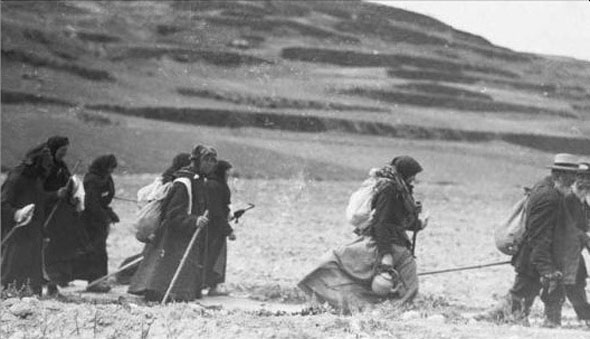Using Refugees as Pawns

The November 13 terrorist attack in Paris, in which a Syrian passport was found at the scene, inflamed fears at home about American immigrant policy. Some presidential candidates demanded America close its borders to Syrian refugees. Twenty-seven U.S. governors declared they would not allow the refugees to settle in their states. In the midst of this immigrant-furor, a Washington Post reporter noted a similarity between the current anti-refugee sentiment and America’s attitude toward Jewish refugees in 1938, pointing out that then, as now, refugees were being used as pawns in the hands of military aggressors.
It’s easy to forget that in those years, just as today, Americans were fearful about allowing fugitives of the Nazi war machine into the U.S. According to a 1938 Fortune magazine poll, 67 percent believed America should keep the refugees out. In that grim year between the Depression and the Second World War, thousands of Jews begged for asylum within the U.S., but relatively few were admitted. So strong was the anti-immigrant sentiment that in February 1939, when a new bill was introduced to offer asylum to 20,000 Jewish children, legislators let the bill die, aware that, as a Gallup poll showed, 60 percent of Americans didn’t want even refugee children in the U.S.
But how fair is the comparison between the refugee situation before World War II and the Syrian refugees today? There are obviously huge differences historically and contextually, but one similarity is the way aggressors have used a refugee crisis to further their own strategic goals. In a March 29, 1941, Post article “War by Refugee,” author Samuel Lubell noted how, after extorting as much money as possible from Jews hoping to escape Germany, the Nazis encouraged them to emigrate to pre-Israel Palestine. At the time, the region was ruled by a British colonial government that would admit only a limited number of Jewish settlers.
Before even these few refugees could land, however, German and Italian radio stations would broadcast the Jews’ arrival to the Islamic residents. The announcers stated that the British were secretly allowing Jews to settle in the area in order to displace the Palestinians.

The situation was ideal for the Nazis, Lubell wrote. If the British did nothing to stop the refugees, they risked an uprising by the Palestinians. If they stopped the refugee boats, they appeared to the world as heartless and indifferent to the fate of Jews.
Similarly when a refugee ship arrived in Chile, Nazi agents stirred an anti-refugee protest that attempted to overthrow the government. “In Brazil, anti-Semitism, or Nazi sympathy, has progressed so far that an American businessman was not permitted to visit the country until he could prove he was not Jewish.”
The point being, from the Nazi perspective: “to get rid of those they do not want to feed, to squeeze as much as possible from them in the process, and dump them where they will do the most harm,” wrote Lubell.
Like Nazi Germany, the Islamic State group (ISIS) is also manipulating the refugee crisis to further its cause. ISIS would prefer to stop the flow of people fleeing Syria’s borders. But, having failed to do that, ISIS is attempting to turn them into outcasts in the West by sowing fear that the refugees include agents of the Islamic state. The Islamic State group has already claimed ISIS has slipped “thousands” of agents into the mass of Syrian refugees entering Europe. As the Washington Post noted recently, “The Islamic State wants you to equate refugees with terrorists. In turn, it wants refugees to equate the West with prejudice against Muslims and foreigners.”
Furthermore, ISIS is aware that the refugee problem prompts accusations and political posturing that increases insecurity, division, and bitterness among Americans.
There is one additional similarity between the refugee situations of the late 1930s and today. As Lubell expressed it, “Whatever occurs immediately, it seems certain that the refugee war will continue as long as the military war does, perhaps even longer.”